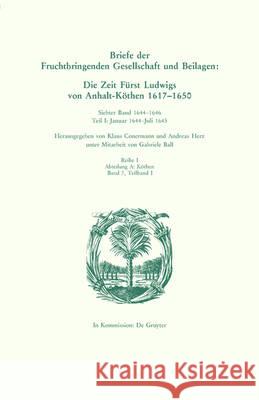1644-1646: Teil I: Januar 1644 - Juli 1645, Teil II: August 1645 - Dezember 1646 » książka
1644-1646: Teil I: Januar 1644 - Juli 1645, Teil II: August 1645 - Dezember 1646
ISBN-13: 9783110519761 / Niemiecki / Twarda / 2016 / 1184 str.
One of the most important projects currently under way in contemporary studies of the early modern period is the research and editorial project on the Fruitful Society (Fruchtbringende Gesellschaft). The Society was founded in Weimar in 1617, and until 1650 it was led from Kothen and continued its formal existence until 1680. As the only German learned society during the 17th century, the Fruitful Society drew on the participation of princes, noblemen, councilors, military leaders, academics, and poets. Together, they formed a leadership class to launch a national German culture that was no longer defined by the court or by religious, class, governmental, or regional boundaries. They envisaged the development of a new German culture primarily aimed at the goals of creating a new, sophisticated social sensibility molded in the spirit of the Renaissance, of cultivating the German mother tongue, and of generating universal benefits from all knowledge and action. Within the scope of this program, which aimed to bring Germany on par with the cultural achievements of its European neighbors, the Society, as a unique association of its kind in the Baroque period, achieved national and international attention. For the first time, this critical edition brings together virtually all of the correspondence undertaken in connection with the activities of the Fruchtbringende Gesellschaft (FG), as well as enclosed documents, the most important academic studies, and other key texts. It documents the visual expressions of the Society's life and testimonials from its historical environment. The edition is systematically divided into two series (I: Letters, Enclosures, and Academic Work; II: Documents and portrayals) as well as three chronological sections (A: Kothen 1617-1650]), B: Weimar 1651-1662], C: Halle 1663/67-1680]).











